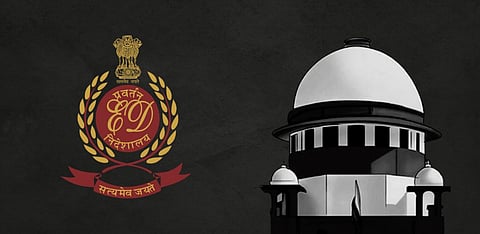

The application has been filed in the context of the Supreme Court's judgment that allowed Sanjay Kumar Mishra to continue in office as the director of the Enforcement Directorate only till July 31, and that termed the third extension in his tenure as "illegal".
—
ON Thursday, a special three-Bench judge of the Supreme Court extended the tenure of Enforcement Directorate (ED) director Sanjay Kumar Mishra to September 15.
Repeating what it had said on July 11, when it granted a tenure extension till July 31 to Mishra, the court clarified today that no further application seeking another extension in Mishra's tenure will be entertained.
The government has consistently contended that the extensions are vital in view of the ongoing peer review of the Financial Action Task Force (FATF).
FATF is an independent international body that provides recommendations to prevent and combat money laundering and terror financing. Its secretariat is located at the Organisation for Economic Cooperation and Development headquarters.
The Bench, comprising Justices B.R. Gavai, Vikram Nath and Sanjay Karol, was hearing an application filed by the Union government asking the court to extend Mishra's tenure till October 15.
Describing the circumstances "unusual" and "extraordinary", the Solicitor General of India Tushar Mehta, appearing on behalf of the Union government, submitted that the continuity of Mishra's tenure is vital for the ongoing FATF peer review process.
Mehta contended that before the assessment team visits India in November this year, the FATF's ongoing process requires various exchanges of communication and consultation.
To this contention of Mehta, Justice Gavai remarked, "Are you giving us the picture that the entire department is full of incompetent persons? Is there only one person in the country who is competent enough to head the FATF process?"
Justice Gavai further pointed out that it is "demoralising" that the department cannot function if one person discontinues holding office.
Justice Gavai's rejoinder today was also a repeat of his comments on May 4, when he had raised concern over the argument about Mishra's indispensability, and enquired whether there is no other competent person in the organisation and whether anyone could be indispensable.
During that hearing, Justice Gavai had noted that the country went on despite the assassination of a sitting Prime Minister in the past.
Today, Mehta further submitted that since India's credit rating is dependent on the outcome of the peer review process, Mishra should be allowed to hold office till October 15 in "national interest".
Additional Solicitor General S.V. Raju submitted that the FATF review has a direct relationship with the image of the country on an international level. He pointed out that money laundering and terror financing are the most relevant aspects of the FATF review.
Raju submitted that since such aspects are directly dealt with by ED, it is necessary that Mishra is allowed to continue till the aforementioned date.
The application was vehemently opposed by the original petitioners in the matter.
Dr Abhishekh Manu Singhvi argued that the arguments about the sensitivities involved in handling the FATF process were available to the respondents when the matter was originally heard by the Bench, but they are being made now to review the July 11 judgment of the court under the garb of seeking an extension.
Senior advocate Prashant Bhushan reiterated that the present averments of the Union government had already been made in the counter affidavit to the original petition.
Advocate Vijay Kumar Chaudhary raised concerns about the damage to the country's international image in the event that an illegally appointed authority is allowed to hold office.
All three advocates also explained that the ED was only one of the many agencies dealing with the FATF process. Dr Singhvi claimed that the revenue secretary of the Union government is the main authority dealing with the FATF process.
Bhushan asserted that since the ED is not the main agency for the FATF review process, Mishra is not as indispensable as the respondents are making him out to be.
Bhushan contended that instead of seeking an extension of Mishra's tenure, the Union government can appoint him as a special advisor to a new director of the ED.
After hearing the arguments of both sides, the Bench allowed Mishra to hold office till September 15 "in the larger public interest".
He shall cease to be the director of ED from midnight of September 15, the Order reads.
Mishra's tenure at the top of the ED has been under the scanner ever since November 2020, when a case was filed against a Union government Order that extended his tenure with a retrospective effect, making it a three-year tenure against the initial two years, even though Mishra had attained superannuation in the interregnum, that is, before the expiry of the two years.
In September 2021, the Supreme Court refused to quash the Order. However, it issued a mandamus prohibiting extensions to Mishra's tenure beyond November 17, 2021, when was to complete three years of his tenure.
On November 15, 2021, the Union government introduced amendments to the Central Vigilance Commission Act, 2003 (CVC Act) and the Delhi Special Police Establishment Act, 1946 that deal with the appointment of the heads of ED and Central Bureau of Investigation.
The amendment provided that the period of office of the director of ED could be extended by up to one year at a time, with no further extension after the completion of a five-year term.
On July 11 this year, a Supreme Court Bench comprising Justices B.R. Gavai, Vikram Nath and Sanjay Karol held that the extensions given to Mishra as director of the ED, after the court had issued a mandamus in the matter, are illegal.
The judgment permitted Mishra to continue in office till July 31. His tenure was previously scheduled to expire on November 17.